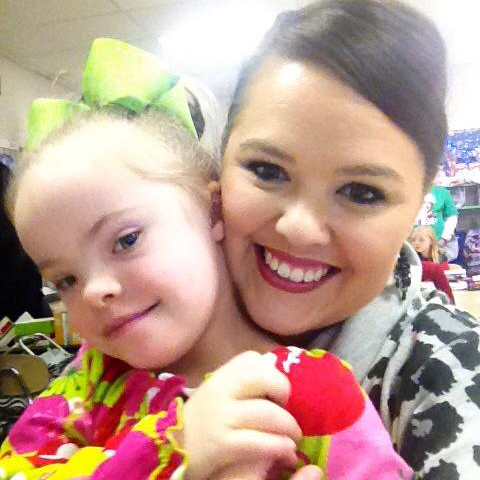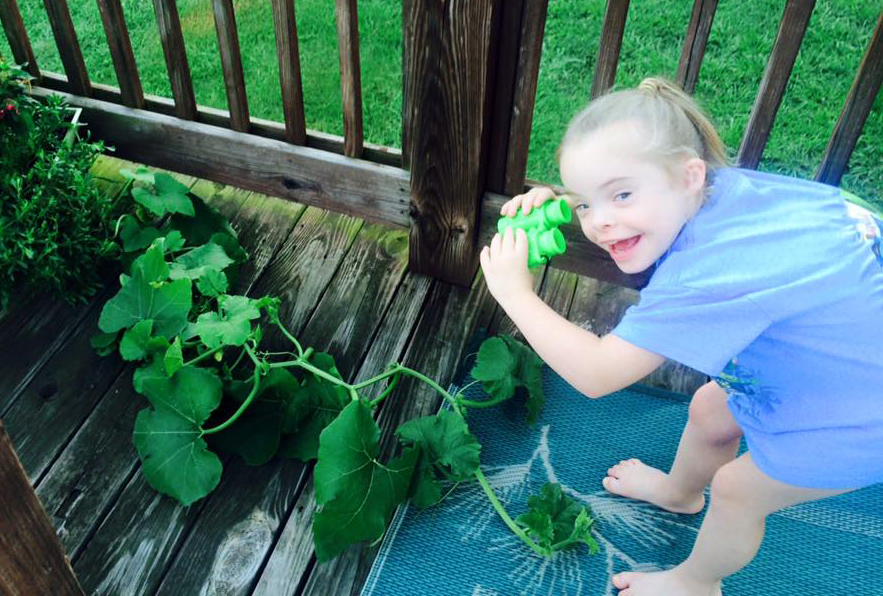The Down syndrome diagnosis was a complete surprise. And she has continued to surprise ever since.
Many people say “living the dream,” but in the Satterfield household, we say “living a miracle.”
Our miracle began on Nov. 28, 2007. Our pregnancy had been great and free of complications. We had scheduled a C-section and everything was going as planned. We got up that morning so excited that we would meet our little girl that day. I remember every sense was heightened: the fresh air, the colors surrounding me, the sensitivity to touch and sound. I was in a place where I had never been before. It was the miracle of my little girl coming into our family.
When we arrived at Vanderbilt we were greeted by the entire staff because I was the only patient scheduled that morning. I was so pampered and reassured that every detail was in place. We were ready. The mood was light all morning. I looked at the corner chair holding the pink and brown personalized diaper bag what seemed a million times.
It said “Lillian.” I knew the name, but not yet the person.
As we were wheeled into the operating room, we waved to the room full of family members who drove in for the big day. Lillian was the first grandchild for both of our families. The C-section went as planned. In only a moment I saw Lillian’s tiny body. Her tiny toes were the first thing I saw. I heard her strong cry and Allen brought our miracle to meet me.
The miracle of life that we created was finally here.
Allen was videotaping the entire thing. It’s a tape I have yet to watch because it captured the traumatic moment that changed our lives forever.
A nurse cleaning Lillian noticed something different. Her eyes were almond-shaped and had a tiny fold underneath. Her tiny hands had a straight line across instead of a curve. At that moment, they looked toward the camera with everything written on their faces: There was something wrong with Lillian. The tape stops and is not picked up again until we are home a week later.
The nurses and the doctor begin to tell us that it looks like our Lillian had Down syndrome.
At that very moment I began to see in black and white.
The colors I had seen earlier were gone. I felt stabbing pain, and the fresh air left me. It was hard to breathe. I was drowning — drowning in emotions and information about Down syndrome and special needs.
Fast forward to 2016.
The colors are back as well as the fresh air and feelings of love and acceptance.
Lillian was born the way she was supposed to be — a miracle for anyone she comes in contact with.
We have hit several milestones that are tiny miracles to a special needs parent. Lillian sat up on her own at 1, crawled at 2 and walked at 3. That is not typical, but it’s normal for us. Lillian is our first child, so everything she does is normal to us.
Lillian is still being followed at Children’s Hospital yearly. She does not have any of the defects that 50 percent of Down syndrome children have. Her heart is perfect. Her eyes are perfect.
She is perfect.
Our primary goal as a family has been to focus on Lillian’s abilities rather than her disabilities. She has a love for playing music and is learning to play the guitar and soon the piano. She has also shown interest in playing the violin. We plan to enroll her in soccer and dance.
Oftentimes the child is defined by their diagnosis. Lillian, with the help of Children’s Hospital keeping her healthy, is breaking through this way of thinking.
Lillian IS a typical child, no matter what diagnosis she has.
She will no longer be the little girl with Down Syndrome. She will be the little girl who can rock out on a guitar!
Down Syndrome International raises awareness of what Down syndrome is, what it means to have Down syndrome, and how people with Down syndrome play a vital role in our lives and communities.

Down syndrome occurs when an individual has three copies of the 21st chromosome instead of two. Learn more about Down syndrome and resources for families. Make an appointment with the Down Syndrome Clinic at Monroe Carell Jr. Children’s Hospital at 615-343-3696.

